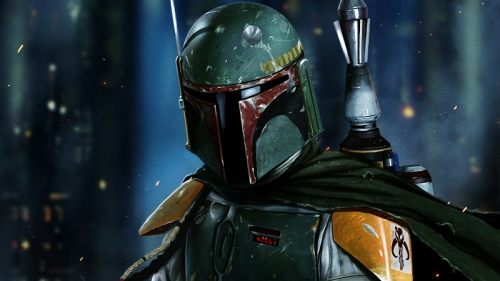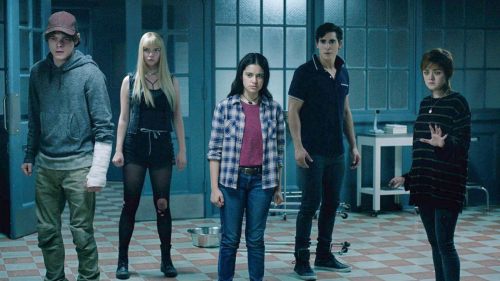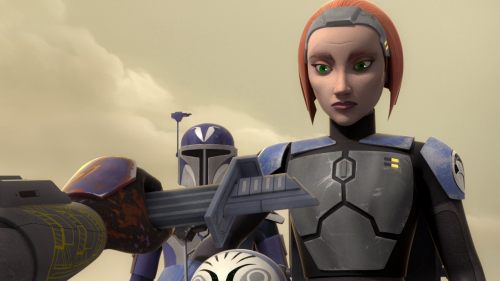What Is STAR WARS, Anyway?
The last couple of years have been turbulent for the Star Wars franchise. Solo: A Star Wars Story’s relatively disappointing performance last May led Lucasfilm to rework its entire franchise philosophy, easing off the accelerator to settle on a biennial release schedule. Rumours that Rian Johnson’s trilogy was to be canceled emerged, only to be canceled themselves. An Obi-Wan Kenobi series was announced, as was a new film project from Marvel mastermind Kevin Feige, but then last week Game of Thrones showrunners David Benioff and D.B. Weiss abandoned their “birth of the Jedi” project, seemingly as quickly as they’d announced it.
That departure kicked off a shitstorm of speculation around the particulars of the situation. (Our bet: Disney didn’t want to get into bed with anyone whose attention would be divided between their projects and a giant Netflix deal.) Given that multiple directors - Josh Trank, Gareth Edwards, Colin Trevorrow, and Phil Lord and Chris Miller - had departed or been shunted off their projects at one stage or another, much of the speculation revolved around the degree to which Lucasfilm chief Kathleen Kennedy orchestrated the move. But it’s only the latest round of speculation about a studio that itself seems to be constantly speculating about its own franchise. How did we get here? And what happens next?
Up until The Force Awakens, only the original Star Wars film had been a major studio production. Every other film in the series - the two sequels and the three prequels - were technically produced independently by Lucasfilm, with Fox serving only as distributor. Disney’s acquisition of the company changed that, and not in the way that fans feared, wherein the series would become more family-friendly and sanitised. That now feels hilarious, given that one new film saw all its main characters get blown up, and in the bigger picture, it feels small-minded. Star Wars is now a money-making franchise through and through, stripped of its original creative voice and beholden to the executives and shareholders of the largest entertainment corporation in the world.
Having producers run a franchise (as opposed to writers or directors) is not necessarily a bad thing. The Star Wars prequels were, let’s not forget, terrible movies, and serious-minded checks on George Lucas’ decision-making could have been intensely beneficial to those productions. For Star Wars, authorship under Disney comes from Kathleen Kennedy (whose producing credits are difficult to dispute), the newly-formed Lucasfilm Story Group (in charge of keeping canon straight across multiple media), and the writers and directors tasked with crafting the stories themselves. But they all answer to executives like Disney CEO Bob Iger, for whom Star Wars was always an investment aimed at selling merch, Disney+ subscriptions, and park tickets. That ultimately means that creative risks are the last thing on Lucasfilm’s mind, and that’s had visible impact on the output.
After The Force Awakens made all the money in 2015, the pressure was on to generate further annual billions for Disney shareholders, but the subsequent films ended up saturating the market to the point of, as of Solo, diminishing returns (with The Rise of Skywalker’s performance yet to be seen). Many comparisons were made to the Marvel Cinematic Universe’s stratospherically high bar for franchise-building. Some such comparisons surely came from inside Disney itself. But Marvel was built from the ground up as a semi-serialised, thrice-a-year series, following in the printed footsteps of weekly comics. Star Wars films, on the other hand, were considered capital-E Events, and had been for generations, coming out at a maximum rate of one every three years. Churning them out at an accelerated clip didn’t sit well with the public - especially when creativity bottomed out with Solo.
With any franchise, a balance must be struck between giving audiences something new and something familiar. Some sequels hit that note perfectly (Terminator 2 perhaps being the finest-ever such synergy, essentially remaking the original film with a heap of role-reversals). But for all the studio’s lip service paid to going in bold new directions, the franchise gets reined back in at every turn. Lord and Miller were hired for their unique creative voice, only to be replaced by 1980s Lucasfilm hires Lawrence Kasdan and Ron Howard. The Force Awakens introduced new characters, but adhered to the narrative beats of the 1977 original so successfully its director was brought back a couple films later. Rian Johnson was rightfully lauded for the narrative and thematic twists of The Last Jedi, but even they actually evolve pretty directly from the characters and themes of the original films (as opposed to what certain fans seem to think those characters and themes were). And Dave Filoni likely only got away with Rebels’ fanciful additions thanks to his animated medium of choice.
This indecision seems to centre on an unwillingness to define what Star Wars is. Broadly speaking, Star Wars has always been about the Skywalker family. Licensed media occasionally branched out a little, but the “true canon” always revolved around Anakin, Luke, and Leia. That tradition has continued in the recent main-saga episodes, though new characters have been introduced (including Kylo Ren, also a Skywalker). The two “Star Wars Story” films revolved around characters or events we first learned of in 1977. The two animated television series both prominently featured Anakin Skywalker (and later, Leia), while the upcoming Kenobi series will be fundamentally influenced by one Skywalker or another.
The Skywalkers can’t last forever, despite an Episode IX title that seems to imply they will, at least in name. So perhaps Star Wars is a universe: a limitless realm of adventure and space magic, with limitless stories to tell. But cinematic universes aren’t really universes per se. The Marvel franchise might be called a Cinematic Universe, but it’s really a set of characters, and characters are what keep mainstream audiences coming back for more. Canonically, Star Wars has far fewer widely-established characters to draw from than Marvel does, so the possibilities for branching out are limited without genuinely creating something new. While younger audiences have embraced the new characters in the sequel trilogy and animated shows, older audiences crave the familiar figures they grew up with. “The same, but different” is a no-win scenario, except perhaps for people like me in an age group smack between the two. It’ll be interesting to watch the reception of The Mandalorian, which technically doesn’t feature any classic characters, but still trades heavily on the popular image of Boba Fett (who, let’s face it, was always just an image anyway).
Another story problem is that Star Wars’ narrative is trapped in a forever-war scenario between various forms of the Empire and the various rebellions that spring up to fight it. The original trilogy centred on this conflict; the prequel trilogy served entirely to set it up; and the sequel trilogy’s biggest narrative mistake lay in rehashing it. The First Order feints at being a hyper-radicalised neo-Nazi terror-cell successor to the Empire; that’s an interesting idea, but it’s barely explored, to the point where in practice, it’s the Empire Mark II. There’s only so much you can do with Big Good Vs Big Bad, and Star Wars has thus far failed to introduce contained sub-narratives like the solo Avenger films have. The pipe dream of many Star Wars fans - that of seeing diverse stories told around diverse characters, and through diverse genres, merely filtered through the Star Wars IP - seems unlikely to eventuate. It's entirely possible Star Wars can only support other genres inasmuch as Marvel can: as a touch of flavouring on top of a mostly unchanging formula.
Between the back-and-forthing over projects, the uninspired nature of several produced projects, and the general uncertainty surrounding Star Wars, Disney and Lucasfilm seem unsure what Star Wars is - other than an incredibly lucrative IP. There’s no central creative voice now. Kennedy isn’t writing the stories. The two creatives that truly nail the themes (Filoni and Johnson) aren’t “in charge” any more than Abrams is. The key to success at Lucasfilm, it seems, is an ability to work within the company culture. That’s obviously important at any workplace, but it’s become such a truism with Lucasfilm, supported by the removal of director after director, that it’s little wonder many filmmakers are reportedly wary of working on Star Wars. That Kennedy brought in Kevin Feige comes as absolutely no surprise: he’s about the safest choice Lucasfilm could make, coming off producing an unprecedented string of hits for a fellow Disney subsidiary.
Amusingly, the now notoriously toxic Star Wars fandom’s ire at Disney stems from something the two groups have in common: they don’t know what they want. They want the same thing they’ve always been given, but they want it to be new, and it’s near-impossible to satisfy both of those desires. At least the pre-emptively despised “family-friendly” approach would have been an ethos; instead, a corporation’s bullish franchising push has met with a studio’s indecision paralysis, resulting in a machine-gun blast of safe creative decisions. For every inspired idea that sneaks through (as in The Last Jedi and Rebels), there are two that spark little more reaction than “oh, yeah, I guess a Kenobi show makes sense”.
The Rise of Skywalker should prove mighty illuminating on all of this. The film has so much to do, it’s incredible anyone agreed to take the job. It needs to cap not just a trilogy, but a nine-film saga, tying off countless emotional and narrative threads. It needs to bring satisfying closure to moviegoers from three distinct generations, yet it also has to inspire those moviegoers to want more. How will Abrams walk that razor-wire tightrope? Will he create something unexpected, or give audiences the same repackaging of old material they think they want? Bringing the Emperor back suggests the latter, but who knows?
2019 will mark the end of an era for Star Wars, and the start of a new one, in which Star Wars films now no longer revolve around the Skywalkers. With no predetermined roadmap ahead, Lucasfilm has big decisions to make. They say fortune favours the bold, but I doubt the ancient Romans who coined that proverb included Disney shareholders. I, for one, hope Lucasfilm doesn’t listen too closely to “the fans,” and takes at least moderate risks with its forthcoming projects. Perhaps Rian Johnson’s in-development trilogy fits in with that; he seems capable of convincing the powers that be to do things a little differently. Or perhaps we’re due for a Marvel-like series of spinoffs of progressively less well-known characters. I’m unsure. You’re unsure. I just hope somebody’s sure, and I hope that somebody works at Lucasfilm.



